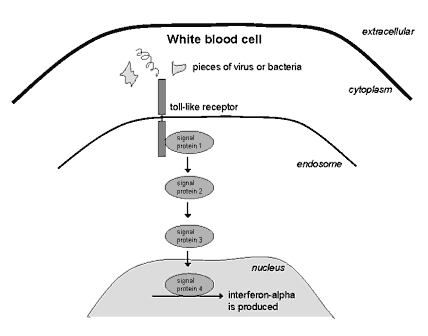What we want to do
Interferon-alpha is a protein that is normally produced by cells only when they have been exposed to virus or bacteria. When our white blood cells encounter these pathogens, they swallow them up and cut them up into pieces. We have proteins on our white blood cells, called toll-like receptors, which can capture these pieces. Once the receptors capture the pieces, they send signals into the white blood cells that there is an infection and they have to go to work to fight it. Within our white blood cells the signal is passed on from one protein to another, until finally the proteins that make interferon-alpha are switched on. Interferon-alpha is a message to other white blood cells to come to the area of infection and kill the intruder. It is normally produced for a short time only, and then the signal is turned off.

In AGS patients, this process goes wrong. Interferon-alpha is produced even though there is no sign of a bacteria or a virus. More white blood cells arrive in the brain ready to fight. They start attacking the patients own cells. Why? And what cells are involved?
We all have many different types of white blood cells. We would like to find out which type of white blood cell is making this interferon-alpha. We would also like to find out why it is making interferon-alpha. Perhaps one of the proteins that capture the signal and pass it on through the cell has somehow gotten turned on randomly. Perhaps the patients own cell pieces are being mistaken for a bacteria or a virus. Or maybe the message to turn off the interferon-alpha is not getting through.
What we therefore hope to do is to isolate different types of white blood cells from AGS patients and see which one is making interferon-alpha. If we can find these cells, we can try to treat them with all sorts of drugs. We can try to stop this type of white blood cell from developing in the first place, or we can try to stop the overactive signaling that tells the cells that they should produce interferon-alpha. Ideally, we want a drug that we think is safe to use in humans, and that won’t affect the development of young children, but we also want to try other experimental drugs as well in the test tube. Even if the unsafe ones cannot be used in patients, they may help us to find where the problem is.
Our goal is to understand, and if possible to treat this disease. AGS has a genetic cause and in this study, we would not be able to identify or remove the underlying cause. We might be able to find a way to stop its damaging effects. Although we can’t promise miracles, we can promise to work as hard as we can to learn as much as possible.
What we are asking
In order to learn more about AGS, we want to study blood and cerebral spinal fluid samples of as many AGS patients as we can. We would ask the cooperation of AGS patients, their parents, and their doctors to collect a few tubes of blood and send them to our laboratory in Amsterdam as quickly as possible after collection with a courier service at our expenses.
Who we are

Prof. Dr. Taco Kuijpers, pediatrician – immunologist (t.w.kuijpers@amc.uva.nl)

Dr. Paul Baars, researcher (p.a.baars@amc.uva.nl)

Jane van Heteren, research technician (j.t.vanheteren@amc.uva.nl)
Amsterdam Medical Center
Postbus 22660
1100 DD Amsterdam
The Netherlands
+31 20 566 9111
|